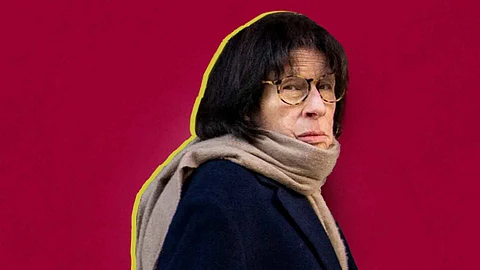
- Reviews
- Power List 2024
- Cannes 2024
- In-Depth Stories
- Web Stories
- News
- FC Lists
- Interviews
- Features
- FC SpecialsFC Specials

Audience question: How would you describe your lifestyle?
Lebowitz: Let me assure you, I would never use the word 'lifestyle'- that’s pretty much how I would describe it.
Martin Scorsese returns to shoot with old friend Fran Lebowitz, continuing a conversation that began more than a decade ago with his HBO documentary Public Speaking. This time, however, it takes the form of a six-part Netflix series broken down into broad themes, ranging from cultural affairs to department of sports and health. All six episodes feature her high-octane rants on various urban absurdities, as she drifts across iconic spaces in the city: from the New York Public Library and The Players Club, to the city subway and Times Square.
It’s hard to introduce Lebowitz. David Letterman once introduced her in Late Night as “a very funny writer and talker”. Now a bonafide New Yorker (meaning that she complains a lot), she started out by writing for Andy Warhol’s Interview Magazine. An essayist, cultural critic and a dynamite public speaker, Lebowitz is known as much for her quote-worthy quips as her aversion to machines of any kind (she doesn’t own a smartphone or computer and still writes longhand). Almost everything she says is characterized by razor-sharp wit and spontaneity, sometimes finishing her answers even before the question is fully posed. Plus, she is never boring- even when you may disagree with her coolly assured opinions on matters big and small.
Watching her talk, you get a sense of what an individual with real opinion looks like; and the allure and dangers of having any opinion at all. There is always an element of anxiety with her words, pouring out uninterrupted in all its rawness (political incorrectness). Yet, you never doubt that she is projecting or posing to get laughs, as the right words magically race out, marinated in deep contemplation. Toni Morrison once told her in an interview that she was “always right but never fair” (One of her famous quotes reads: “Think before you speak, read before you think”). When she talks, she is at once vulnerably sincere and boldly assertive.
Listening to Lebowitz remarking on sundry matters may make you question your own loosely held opinions or water down the ones you held on to dearly. You might feel talked down, challenged or plain annoyed- waiting for the opportunity to see her stand corrected. But then, she is no ordinary opinion-maker. Dig deeper and you will admit to being swayed by her frank charm- discovering behind a steely voice the warmth of mischief in sardonic humor, that pokes fun at everything from emotional support animals to wellness culture. It’s a voice that is buried in us all, but never finds the right mix of anger and dispassion to express itself. To laugh with Lebowitz is to laugh at the “baggage" of our own seriousness and convoluted modes of thinking and living. It’s a laugh best enjoyed when we can quickly let go of the delusions that are so precious to us; delusions that seem important to our carefully constructed identities (which may explain some of the extreme reactions people have towards her).
Martin Scorsese, in many ways, seems best suited to direct an unusual series such as this. Both a passionate New Yorker and fast talker with wide-ranging interests, he shares several qualities with Lebowitz (and most receptive to her humor). Bringing his love for fun musical segues and kinetic edit style, he is able to create an engaging mosaic from interviews, dinner table conversations and archival footage, inter-cut with shots of contemporary New York street life. By the end, we get a double portrait of a human character and a city in constant flux, linked inextricably with each other. The series is both a welcome addition to Scorsese’s non-fiction filmography (beginning with ‘Italianamerican’) and a reflexive homage to an old friend. In making these, Scorsese appears most comfortable and having a lot of fun- which for Lebowitz, is always “a good reason to make anything”.